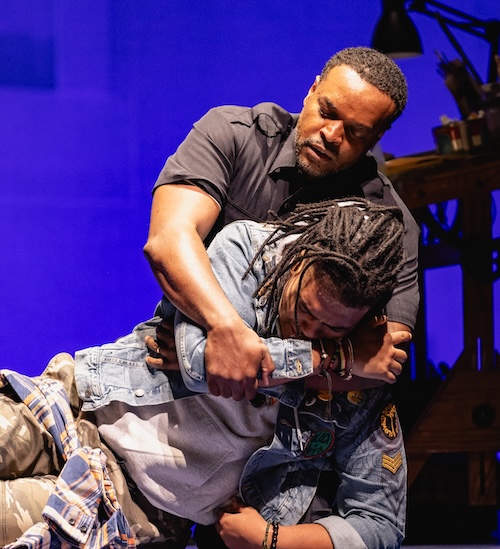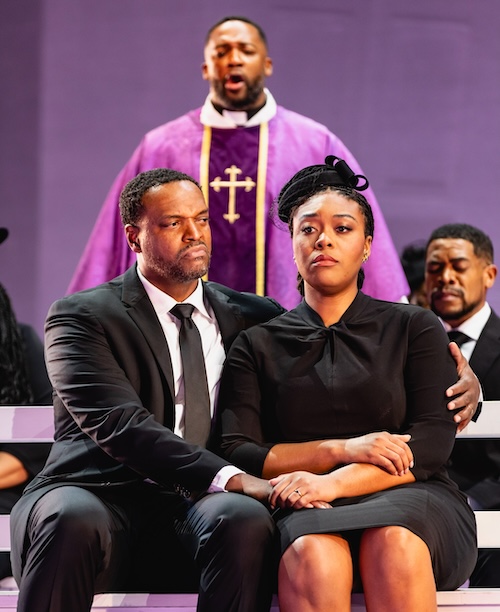Worthy cast and music buried by ramshackle libretto, heavy polemics in Lyric Opera’s “Blue”

Delayed four years by the pandemic, Jeanine Tesori’s Blue finally arrived at Lyric Opera Saturday night, having already appeared at the Glimmerglass Festival and Washington National Opera (co-producing companies with Lyric), as well as making the rounds in Detroit, Seattle, Pittsburgh and elsewhere.
Tesori’s career is on an upward fast track. Originally a composer for musical theater, her most recent opera, Grounded, about a woman Air Force drone pilot, opened the Metropolitan Opera season this fall (to mixed notices) following its world premiere at WNO in 2023.
Premiered at Glimmerglass in 2019, Blue tells of a Harlem family that is torn apart by politics and family conflicts. (The unnamed characters are portentously called The Father, The Mother and The Son.) The opera begins with the Mother telling her girlfriends that her new husband is a policeman to which they react negatively. She then informs them that she is pregnant and having a boy to which they respond by singing that the U.S. is so irredeemably racist that she should abort the child since it is not safe for a black male to grow up in this country. Eventually the girlfriends come around.
With a massive jump cut 16 years later, the teenage Son is now an angry activist and petty criminal who is resentful towards his father for being a cop in addition to what he views as the racist white establishment. After a heated violent argument, there is a reconciliation with the son breaking down in tears.
Act II picks up the action after the Son has been shot and killed by a policeman at a demonstration. (The details are left unexplained except that the protest was “peaceful” and that the shooting officer was white.) The Father suddenly does a 180 and becomes as vengeful and filled with hatred as his dead son, telling The Reverend of his plan to shoot the cop that killed his son. In an extended dialogue the Reverend preaches forgiveness and Christian charity. After an extended funeral church service an uneasy solace is reached. The opera ends with a flashback of the previous family argument and a fantasy sequence of the family sitting down happily together for a prayer and meal.
There are worthy things in Blue, not least Jeanine Tesori’s music. The style is derivative at times with near-cribs from Barber, Bernstein and Gershwin’s Porgy and Bess flitting by. A loud chord or high vocal note ends nearly every number as if to cue an invisible “Applause” sign.
Still, at its best, Tesori’s score is attractive and almost defiantly tonal and traditional. There are luminous swelling chords and quasi-minimalist rhythms at dramatic peaks and the arias and ensembles have undeniably beautiful moments.
While the story is compelling and topical, the opera is most successful in the scenes of high family drama. The extended Act I confrontation between father and son is intense, riveting and hard to watch as the resentful youth unleashes his hatred and vitriol on well, virtually everything—his father, the police, white people, capitalism, and the country.
There are two main problems that ultimately prove fatal to Blue: the dubious nature of its main argument and the ramshackle narrative by librettist and director Tazewell Thompson.
Though only created five years ago, Blue already feels like a dated period piece. The central conceit, repeated ad infinitum, is that white cops are evil and bent on killing black males and all of white society is responsible. (The Greek chorus of Girlfriends repeat “We see you” five times while pointing at the audience.)
Come on, man. While there have indeed been some horrific incidents of police shooting blacks, most seem to be due to poor training and fatal incompetence rather than racial hatred as a motivation. Most police, of all ethnicities, just want to do a decent job, make it through their shift alive, and get home to their families. Repeating a simplistic false narrative ad infinitum doesn’t make it true.
Some of Thompson’s text is offensive and incendiary. Outside of prime time on MSNBC, one will rarely hear the word “white” repeated so many times and with such hostility and venom as in this opera’s two-hour span. After the son is killed, the Girlfriend trio refers to police as “The uniformed and packing great white hunter” and “Butchers sharpening their knives/Hunting the dark meat” as well as “These sons of bitches. These indifferent men hacking our children to pieces like a squealing pig.”
Consider the dystopian state of Chicago in 2024 when all citizens are captive to epidemic violent crime and people are getting carjacked at gunpoint in the middle of the day on Michigan Avenue. Having to deal with that constant threat on a daily basis, even progressive opera-goers have reached their capacity for self-flagellation over social justice issues and are unlikely to agree that the police are the enemy.
The other issue is that Thompson’s libretto is poorly structured and convoluted with a crucial lack of convincing character development. Moments of gloppy Hallmark Channel sentimentality alternate with unfunny comic bits (the goofy Nurse) and tepid scenes that go on forever. The second act in particular seems interminable with an extended funeral church scene and two or three possible endings followed by a jarringly dissonant dream sequence. The Mother sings joyfully of the food she is preparing and the son suddenly becomes a smiling Ricky Nelson-like model son. Hateful as his vitriol was, the kid was more credible and engaging when he was an angry Commie.
Ultimately, the positive musical elements in Blue are weighed down by the awkward narrative, problematic libretto, and bludgeoning polemics.

Lyric Opera has assembled a worthy cast that makes the most of their opportunities individually and collectively.
Kenneth Kellogg created the role of the Father at the opera’s premiere and his easy assurance was clear in this Lyric Opera debut. Kellogg brought a likable everyman quality to the police officer who attempts to understand his angry son while trying to be the best husband and parent he can. The singer’s big resonant bass descends to Slavic subterranean depths, and the slightly worn quality makes his character seem all the more genuine and human. Unfortunately, the Father suffers most from the libretto’s underdeveloped characters, changing instantaneously from conservative cop to fire-breathing dissident at the top of Act II. Why not have a big aria where the Father struggles with his own anger and guilty feelings and show his transition musically instead of abruptly dropping it on us?
Travon D. Walker delivered a sensational performance as the embittered Son. The second-year Ryan Opera Center member possesses a ringing tenor voice with words crystal-clear. He was also a superb actor, bringing daunting fury to the fiery radical who resents his father, the police and the establishment.
As the Mother, Zoie Reams’ words were not always clear and her character, like the Father, was ill defined. Even so she gave ardent voice to her Act I aria singing of her love for her husband as well as her Act II lament for her son.
Norman Garrett was a dignified presence as the Reverend, bringing a humanity and welcome moral compass to the often-tendentious narrative. His sturdy baritone handled the vocal challenges, though the role’s punishing high tessitura seemed to take some toll on the singer by the end of the evening.
Ariana Wehr, Adia Evans and Kristy Swann were a big-voiced and big-personality trio, as the Mother’s girlfriends; Wehr doubled as the would-be comical, high-note-singing Nurse.
As the Father’s friends and police colleagues, Terrence Chin-Loy, Jonathan Pierce Rhodes and the towering, deep-voiced Ryan Center member Christopher Humbert Jr. provided a convivial haven of male bonding.
Set against a massive backdrop of a leaning apartment house facade, Donald Eastman’s bare-bones scenic design was serviceable, consisting of a few pieces of furniture center stage, which were carted on and off by cast members. Jessica Jahn’s costumes provided welcome bursts of color, not least the son’s dead-on, contemporary urban garb.
In his company debut, Joseph Young did a capable job in the pit. The young conductor kept the often static action moving efficiently and gave sumptuous impact to Tesori’s lyrical flights, though occasionally burying the singers in the process.
Blue runs through December 1. lyricopera.org
Posted in Performances



Posted Nov 27, 2024 at 4:15 pm by Jane Wells
This review is exceedingly tone deaf. How many black men, doing nothing wrong, have been killed by the police? I don’t think we can let the police off the hook as not being responsible for that. Can we let other people off the hook who choose to overlook that kind of terrible racial Injustice, racial Injustice that kills people? I think this review was shameful in its ignoring of the actual facts of American life for black people.
Posted Nov 27, 2024 at 5:35 pm by JCrane
This review is pure nonsense with an author who seems intent on panning this fine work. He calls it, confoundingly “a bit dated”! Perhaps he doesn’t read the newspapers nor see recent political results. The events portrayed in Blue are very much with us and we need operas like this to tell us these stories. IF he wants to see a “dated” opera, perhaps he should attend The Marriage of Figaro, which is running concurrently.
Derivative? That’s a way of saying the composer isn’t original. I don’t know an opera composer, dating back to the 1700s, who hasn’t built on what’s gone before.
Blue is a powerful opera, well written and composed and belongs in the current canon.
Posted Dec 01, 2024 at 10:03 pm by Dr. Carl Ratner
To read the review you would imagine that the libretto must spend pages and arias calling out evil white people, when I honestly cannot remember more than one or two mentions of the word “white” in the whole work. I’m sure there were more than I recall but it certainly wasn’t a significant theme of the piece. . Likewise the reviewer spends time acting as if the work was generally critical of the police despite the fact that four of the characters are police officers and are all quite sympathetic
I did feel that there were structural problems with the libretto, but what it certainly contained was an accurate and heartfelt rendering of the actual thought process of a black family with a son. I know from personal experience that this depiction is accurate as there are young Black males in my family.
It is so important to add works like this to the operatic canon.